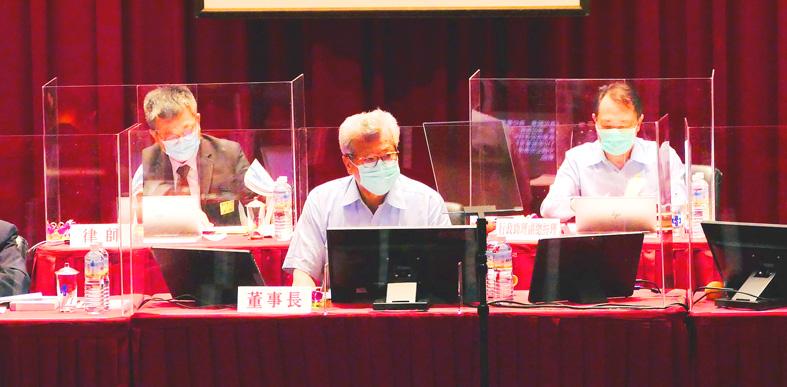The nation’s largest steelmaker, China Steel Corp (CSC, 中鋼), is setting ambitious carbon emission reduction goals, chairman Wong Chao-tung (翁朝棟) said yesterday.
“By 2025, we aim to reduce emissions by 7 percent, and by 2050, we will achieve carbon neutrality,” Wong told shareholders at the company’s annual general meeting in Kaohsiung, which was also streamed online. “The company will develop into a dual auxiliary company: a high-end steelmaker and a green energy company.”
The gross margin for “high-end” steel is at least 20 percent, Wong said, adding that last year, CSC shipped 296,000 tonnes of high-end steel.

Photo courtesy of China Steel Corp
“The era of high steel prices is upon us,” he said, predicting a strong fourth quarter.
As for CSC’s move into the renewable energy sector, Wong said it was a strategic investment in the future.
“Apart from semiconductors, the green energy industry is the most hopeful bright spot for Taiwanese industry,” he said.
Seventy percent of steel used in Tesla Inc’s electric vehicle (EV) motors come from CSC and the company plans to join Hon Hai Precision Industry Co’s (鴻海精密) MIH Open Platform alliance for the development of EVs, and “take full initiative in developing the EV market,” Wong said.
“Thanks to a clear resurgence in manufacturing at home and abroad, as well as the strong demand for vehicles, basic infrastructure and home appliances, demand for steel now outpaces supply in the global market,” the company said in a statement.
According to Japanese news reports, CSC’s market value has risen to make it the sixth-largest in the world.
Shares of CSC yesterday rose 1.63 percent to end at NT$37.5 in Taipei trading, giving the company a market value of NT$590.1 billion (US$21.22 billion).
“For a steel producer that only makes 10 million tonnes of steel per year to achieve such a high market value is remarkable,” Wong said.
Due to a decline in demand caused by the COVID-19 pandemic, CSC reported earnings per share of NT$0.05 last year, down from NT$0.57 the previous year.
Shareholders yesterday approved the company’s proposed distribution of a cash dividend of NT$0.3 percent, which suggested a payout ratio of 600 percent, as the company decided to use some of its reserved profit to pay for cash dividends.

Sweeping policy changes under US Secretary of Health and Human Services Robert F. Kennedy Jr are having a chilling effect on vaccine makers as anti-vaccine rhetoric has turned into concrete changes in inoculation schedules and recommendations, investors and executives said. The administration of US President Donald Trump has in the past year upended vaccine recommendations, with the country last month ending its longstanding guidance that all children receive inoculations against flu, hepatitis A and other diseases. The unprecedented changes have led to diminished vaccine usage, hurt the investment case for some biotechs, and created a drag that would likely dent revenues and

Global semiconductor stocks advanced yesterday, as comments by Nvidia Corp chief executive officer Jensen Huang (黃仁勳) at Davos, Switzerland, helped reinforce investor enthusiasm for artificial intelligence (AI). Samsung Electronics Co gained as much as 5 percent to an all-time high, helping drive South Korea’s benchmark KOSPI above 5,000 for the first time. That came after the Philadelphia Semiconductor Index rose more than 3 percent to a fresh record on Wednesday, with a boost from Nvidia. The gains came amid broad risk-on trade after US President Donald Trump withdrew his threat of tariffs on some European nations over backing for Greenland. Huang further

Macronix International Co (旺宏), the world’s biggest NOR flash memory supplier, yesterday said it would spend NT$22 billion (US$699.1 million) on capacity expansion this year to increase its production of mid-to-low-density memory chips as the world’s major memorychip suppliers are phasing out the market. The company said its planned capital expenditures are about 11 times higher than the NT$1.8 billion it spent on new facilities and equipment last year. A majority of this year’s outlay would be allocated to step up capacity of multi-level cell (MLC) NAND flash memory chips, which are used in embedded multimedia cards (eMMC), a managed

CULPRITS: Factors that affected the slip included falling global crude oil prices, wait-and-see consumer attitudes due to US tariffs and a different Lunar New Year holiday schedule Taiwan’s retail sales ended a nine-year growth streak last year, slipping 0.2 percent from a year earlier as uncertainty over US tariff policies affected demand for durable goods, data released on Friday by the Ministry of Economic Affairs showed. Last year’s retail sales totaled NT$4.84 trillion (US$153.27 billion), down about NT$9.5 billion, or 0.2 percent, from 2024. Despite the decline, the figure was still the second-highest annual sales total on record. Ministry statistics department deputy head Chen Yu-fang (陳玉芳) said sales of cars, motorcycles and related products, which accounted for 17.4 percent of total retail rales last year, fell NT$68.1 billion, or